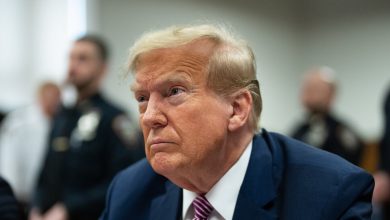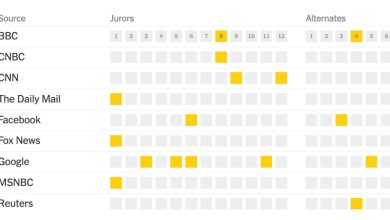Inside the Flawed Vetting Process That Led Gov. Hochul to Brian Benjamin

The first warnings about Brian A. Benjamin came early, just three days after Kathy Hochul learned she would become governor of New York and began a hurried search for her second-in-command.
At the top of a 63-page vetting report, two flags drew attention to potential legal concerns about Mr. Benjamin’s use of campaign funds, according to three people familiar with the document. Among them were news accounts of dozens of potentially fraudulent contributions steered to Mr. Benjamin’s failed campaign for New York City comptroller.
When Ms. Hochul and her team pressed for answers, Mr. Benjamin, then a state senator from Harlem, suggested he had made innocent mistakes and gave the impression that all outstanding issues were being resolved. But he failed to disclose something far more troubling: Prosecutors from the Manhattan district attorney’s office had already served a subpoena to his comptroller campaign, inquiring about the suspicious donations, according to two people familiar with the subpoena.
On Aug. 26, after just a two-week search, Ms. Hochul named Mr. Benjamin as her lieutenant governor. Less than a year later, that decision and the hasty vetting process that led to it have come to haunt Ms. Hochul’s young administration.
Mr. Benjamin, 45, resigned on April 12, hours after federal prosecutors in Manhattan unsealed bribery charges against him. The indictment stemmed from the same contributions first flagged in the August vetting report.
In an effort to contain the political damage before she faces Democratic primary voters, Ms. Hochul has acknowledged that the vetting process — overseen by a small team of advisers — was flawed and that she had been unaware of the subpoena to Mr. Benjamin’s campaign.
“We did not have the truth at the time the decision was made,” she said shortly after his resignation.
But a close examination by The New York Times, based on documents and the accounts of a dozen people familiar with the process, shows in greater detail how Ms. Hochul and her team played down, missed or ignored warning signs; rushed through sensitive vetting tasks; and ultimately took Mr. Benjamin’s explanations about high-stakes ethics issues at face value during an informal process that even some of those involved conceded was a mess.
That also meant that as federal prosecutors began to close in on Mr. Benjamin in recent weeks, Ms. Hochul brushed the matter aside — tying herself closer to her running mate as late as the eve of his arrest.
For Ms. Hochul, the episode threatens to undermine a pledge to root out corruption in Albany just as she begins to campaign in earnest for a full term as governor. And with Mr. Benjamin out of the race, the governor faces the prospect of campaigning this fall with a running mate she did not choose.
Ms. Hochul’s office declined to answer a list of questions from The Times, citing Mr. Benjamin’s ongoing legal case, and referred reporters to an April 13 radio interview the governor did with WNYC.
Ms. Hochul said she had been assured that Mr. Benjamin “was clean” and implied she would not have picked him had she known more at the time. She conceded that “clearly we need to have a different process, a more strengthened, streamlined process.”
The scramble for a lieutenant governor
When Andrew M. Cuomo announced on Aug. 10 that he would resign in the face of allegations of sexual harassment, Ms. Hochul found herself thrust into the governor’s office with virtually no notice, no staff and only 14 days to prepare.
In searching for a second-in-command, she imposed a tight deadline and relied on a skeleton crew of advisers: her chief of staff, Jeff Lewis; other loyal government aides, including members of her eight-person lieutenant governor staff; and a handful of outside political advisers, some from out of state.
Collectively, the team had little experience with the kind of high-stakes evaluation she needed for the state’s No. 2 official, and few connections to New York City’s political insiders who could have helped them sort through warning signs. Asking Mr. Cuomo’s seasoned senior aides for help was out of the question because Ms. Hochul’s team largely distrusted them.
Almost immediately, Ms. Hochul, a white moderate Democrat from Buffalo, indicated to advisers that she was looking for a running mate from New York City, ideally a younger Black or Latino Democrat who could increase her credibility in communities that barely knew her.
Her team ended up seriously vetting two candidates, both considered rising stars in the State Senate: Mr. Benjamin, a former businessman, and Jamaal Bailey, who led the Bronx Democratic Party committee.
Mr. Benjamin had a leg up. An Ivy League graduate who had spent much of his career working in banking and affordable housing development, he had risen quickly in Albany since his election in 2017. His warm relationship with Ms. Hochul, who had spent seven icy years as Mr. Cuomo’s No. 2, worked in his favor, she told associates. Several prominent New York City leaders — including Kathryn Wylde of the Partnership for New York City and the Rev. Al Sharpton — privately praised Mr. Benjamin to Ms. Hochul.
Still, some political leaders, including Keith L.T. Wright, the chairman of the Democratic Party in Manhattan, quietly raised concerns with Ms. Hochul about Mr. Benjamin’s political standing. He had finished fourth in his race for comptroller, failing to even carry his own State Senate district in Harlem. Others questioned the wisdom of picking a running mate from Manhattan, given the shift of Black power toward Brooklyn and other boroughs.
Mr. Benjamin also had baggage that was well known among New York City Democrats.
A property he owned in Providence, R.I., had been foreclosed upon. Records show that he had failed to pay taxes in New York and Rhode Island about a decade ago, leading to tax liens (since repaid). He had appeared as a love interest of a main character on the Oprah Winfrey Network’s “Love in the City” reality show, but was accused of being a thief after the relationship ended.
And as early as the first months of 2021, reports were circulating about campaign finance irregularities related to Mr. Benjamin’s comptroller campaign and a wedding celebration.
Those last two issues arose when a vetting team in the governor’s office undertook a scrub of publicly available information. The team sought to identify reputational risks, conflicts of interest, negative or notable press and troubling social media activity, as well as related lobbying records and campaign filings.
The report, prepared on Aug. 13, first flagged a Daily News article that raised questions about Mr. Benjamin’s use of State Senate campaign funds in 2018 for his wedding celebration at a jazz club in Harlem. Ms. Hochul had attended.
When questioned by Ms. Hochul’s aides, Mr. Benjamin indicated that he would repay those and other questionable expenses to his State Senate campaign account. The first tranche of $6,993.75 was paid back on Sept. 2, days before he was sworn in, according to campaign finance records. Mr. Benjamin made additional repayments for close to $19,000 for car-related expenses in November, when he signed a formal settlement agreement with the State Board of Elections.
The board had been investigating the spending since at least August, according to a copy of the settlement shared with The Times, which assessed a $2,550 penalty.
Mr. Lewis, who left his post as Ms. Hochul’s chief of staff earlier this year to work on her campaign, did not return repeated requests for comment. A lawyer for Mr. Benjamin declined to comment.
Taking Benjamin at his word
The second issue flagged in the Aug. 13 vetting report would prove more consequential.
It related to a January 2021 report by The City that had identified a string of suspicious donations to Mr. Benjamin’s comptroller campaign, in some cases made on behalf of people who said they had never given to him.
Federal prosecutors, who took over the Manhattan district attorney’s investigation last fall, would later say that the donations were part of a corrupt scheme by Mr. Benjamin and a Harlem real estate developer, Gerald Migdol.
What to Know About Lt. Gov. Brian Benjamin
Who is Brian Benjamin? A Democratic state senator from Harlem, he was selected by Gov. Kathy Hochul to be her lieutenant governor in a move widely seen as an attempt by Ms. Hochul to diversify her ticket before this year’s elections. Mr. Benjamin resigned from the position following an indictment in connection with a campaign finance scheme.
The investigation. Federal authorities have been investigating whether Mr. Benjamin participated in an effort to funnel fraudulent contributions to his unsuccessful 2021 campaign for New York City comptroller. This inquiry stemmed from an indictment charging a Harlem real estate investor with trying to conceal contributions to a candidate in that race.
His resignation. On April 12, Mr. Benjamin was arrested and stepped down as lieutenant governor hours after federal prosecutors unsealed an indictment implicating him in a brazen scheme to enrich his political campaigns with illegal donations. The resignation could prove to be a serious political liability for Ms. Hochul.
His defense. Mr. Benjamin has pleaded not guilty to bribery and fraud. His lawyers said that the government had overreached in bringing “flimsy and unwarranted” charges against the lieutenant governor and that he had not received personal benefits that would amount to political corruption.
According to the indictment of Mr. Benjamin, while he was in the State Senate, he helped steer $50,000 in grant money to Mr. Migdol’s charity in exchange for tens of thousands of dollars in fraudulent contributions to his campaigns, like the ones The City highlighted.
At the time that he was being vetted, though, Mr. Benjamin reassured Ms. Hochul’s team that the issue would not linger. A person close to Mr. Benjamin said he did not believe that his dealings with Mr. Migdol raised any issues that would cause problems for him or for Ms. Hochul. Mr. Benjamin pleaded not guilty after his arrest.
Mr. Lewis appeared satisfied with Mr. Benjamin’s responses, telling some colleagues that he had addressed the flags raised in the report. It is unclear whether Ms. Hochul questioned Mr. Benjamin about the issues herself.
But Mr. Benjamin did not disclose the subpoena from the Manhattan district attorney, which was made public four weeks ago by The Daily News.
Ms. Hochul’s allies have used that fact to defend her.
“I don’t see how you can blame the governor or her vetting team for taking the word of Brian Benjamin,” said Jay Jacobs, the New York Democratic Party chairman. “The governor’s vetting team would have had no access to the federal grand jury or the investigation.”
Ms. Hochul’s political opponents view it differently. They say the episode betrays flawed judgment and inexperience.
“For her to say she didn’t know shows either a lack of judgment and a lack of experience, or it’s a complete and total lie,” said Representative Tom Suozzi, a Long Island Democrat running against Ms. Hochul.
As part of a customary background investigation, the New York State Police asked the United States attorney’s office in Manhattan if it had anything to share on Mr. Benjamin, and was eventually told it did not — although that disclosure came two weeks after the State Police had delivered its preliminary background check to Ms. Hochul. It is not clear whether federal prosecutors had already begun their investigation.
It is also unclear if Mr. Lewis or any of Ms. Hochul’s aides reached out through unofficial channels to the Manhattan district attorney’s office or federal prosecutors during the vetting process to glean whether Mr. Benjamin was under investigation. The practice, while not a standard one, was sometimes used by senior Cuomo officials who would place informal calls to prosecutors for a signal about whether someone they were vetting might present a political or legal liability, according to two former state officials.
Inez Dickens, an assemblywoman from Harlem, said an aide to Ms. Hochul called her to solicit her thoughts on Mr. Benjamin and their history — but not to ask about any outstanding ethical issues.
“They didn’t bring it up,” she said.
The State Police began its more thorough background investigation on Aug. 17, interviewing Mr. Benjamin’s family and associates and scouring his criminal and financial history.
As part of that check, Mr. Benjamin on Aug. 16 filled out a questionnaire. It asked whether he had ever been contacted by authorities about any “legal, regulatory, ethical, or campaign finance, infraction or violation or investigation” or knew of anything that “if known, might reflect poorly on the State of New York.” Mr. Benjamin answered both in the negative. (Months later, he was forced to revise or clarify several answers; prosecutors separately charged him with falsifying records when he stated on the form that he had never used a public office to help a donor.)
The State Police provided Ms. Hochul with the results of its full background investigation on Aug. 24, the same day she was sworn into office and teased in an interview that she had decided on a lieutenant governor.
Two days later, she unveiled her pick at a campaign-like event in Harlem, along with Mr. Benjamin, the Rev. Sharpton and Hazel Dukes, the longtime head of the New York chapter of the N.A.A.C.P. and another leading Benjamin booster.
Mr. Migdol was arrested on Nov. 19, and federal prosecutors began serving subpoenas. Even then, Ms. Hochul and many of her advisers did not believe the issues were serious enough to warrant asking him to step aside.
“I have utmost confidence in my lieutenant governor,” Ms. Hochul said during a news conference in Albany on April 7. By the following week, Mr. Benjamin had surrendered to authorities.
Grace Ashford and William K. Rashbaum contributed reporting. Susan C. Beachy contributed research.




